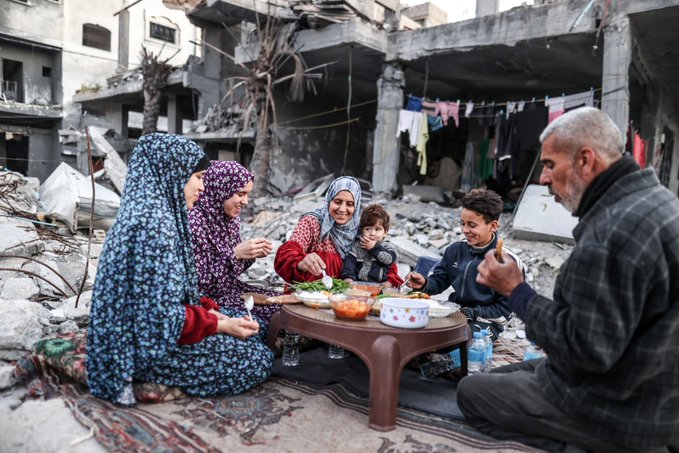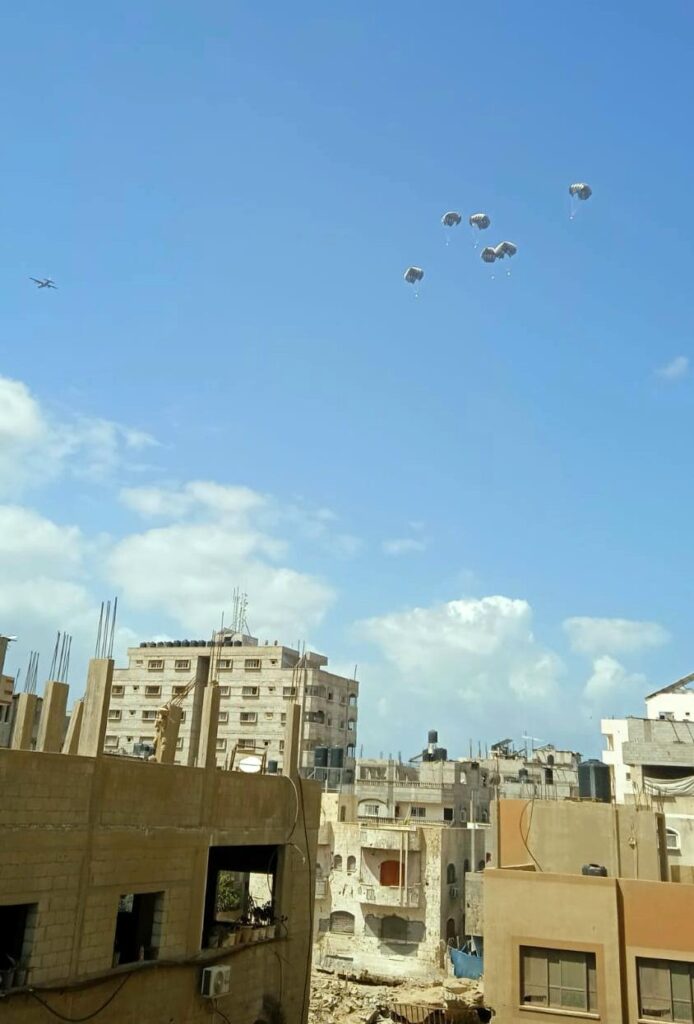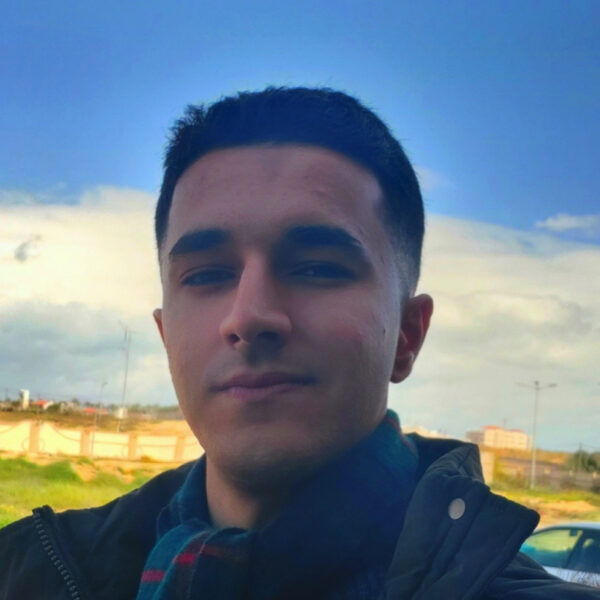
I live in war-torn Gaza, where the sounds of explosions and gunfire echo through the streets, where families are displaced from their homes, and where hunger and fear are our constant companions. This year, the arrival of Ramadan has been both a test of our faith and a reminder of our resilience.
Ramadan is a month of worship, happiness, and blessings, as well as a source of peace for Muslim communities. In the midst of war, Ramadan becomes a time of heightened spiritual connection and a lifeline of hope. Through our observance of fasting, prayer, and charity, we find a sense of purpose and solidarity that sustains us through these darkest times. Despite the harsh realities of life under siege, we come together to observe the holy month to the best of our abilities.
The bombing continues during Ramadan
On March 12, 2024, the first day of Ramadan, I was sitting in a dark tent with my family, surrounded by the din of exploding bombs and the buzzing of Israeli drones. Suddenly, a stream of beautiful memories from last Ramadan poured into my mind. These memories, particularly the memories of our Iftar meals — the meals where Muslims break our fast — made me feel even closer to my family and community.
I remembered how in the hour before sundown, our neighborhood would be flooded with the savory aromas of special dishes like maftoul, a fragrant Palestinian couscous and chicken dish; musakhan, sumac-spice chicken wraps; and ma’louba, a spiced rice tower layered with meat and caramelized vegetables.
This year, even a loaf of bread is difficult to come by.
When I see Ramadan decorations hanging on the wall, they give me hope. These feelings are shattered when I see bodies hanging from the ceilings of homes destroyed by an Israeli airstrike. In past years, when I prayed Taraweeh prayers (among the most important religious rituals during Ramadan) in the mosque, I felt at peace. This year, the Israeli occupation targeted and destroyed all the mosques in Gaza. Now we pray in the street.
My little brother loves Ramadan lantern decorations. One night, he told me he had seen many lanterns in the sky moving and winking. He did not realize that the sky was not full of lanterns but of Israeli combat planes that could kill us at any moment.
Recently, I was thinking about happy family memories when, suddenly, our entire area was filled with light, followed by a loud explosion that could be heard everywhere. It was an Israeli fire belt, a massive airstrike that can level entire blocks.
Food airdrops after a long day of fasting
When the Israeli war began, the flow of food, water, and other necessities into the Gaza Strip stopped. What little food Israel allows in is so expensive that few people can afford it during Ramadan. The lack of food has been devastating, especially for Gaza’s children. Hunger has reached catastrophic levels in northern Gaza, with children dying from hunger-related diseases and suffering from severe levels of malnutrition. A massive relief operation is needed.

Rather than pressuring Israel to allow more food trucks into Gaza, the United States and other countries cut funding to UNRWA, the agency best equipped to provide humanitarian aid to Gaza. Then, along with several other countries, it began dropping packets of food from the air. When my brother Oday first heard about the airdrops, he was excited. “If you are strong and can run, you can get food,” he told me.
My brother’s excitement soon faded. While some people have benefited, the airdrops have had little positive impact. A friend of mine in northern Gaza told me he sees airdrops of food every day, many of which fall into the sea. He cannot get to them because he is afraid he will drown, be killed by an Israeli sniper, or be hurt by people crowding around the food packet. “I feel like I’m in the jungle, where only the strongest survive,” he told me.
Searching for food packages can be dangerous and difficult. Elderly or disabled people do not have the strength or stamina necessary to search for food packages that could be on rooftops or the backfill of demolished homes. Another friend of mine in the north tells me he has stood in the sun for five hours a day waiting for airdrops of food, only to see half the packets fall into the Mediterranean. When packets land in areas patrolled by Israeli occupation forces, it is too dangerous for anyone to retrieve them. I have seen packages break open when they hit the ground. I feel heartbroken when I see images of children collecting the flour or rice that has spilled from them.
Even if all the food dropped from planes was accessible to Gazans, it would only cover a small fraction of the need. The first airdrop delivered 38,000 meals, even though over 2 million people live in Gaza. Before the war, it took 500 truckloads of supplies (including 75 truckloads of food) each day to meet our needs. Now only a small fraction of that is getting through. Very little of that makes its way to northern Gaza. The airdrops don’t come close to making up the difference. “They are like drops in the ocean,” as my little brother Oday says.
The airdrops can also be dangerous. People have been killed or hurt by falling food when parachutes have failed to open. My uncle was sitting in his house when a large food package smashed through his window. Another friend of mine was injured in the head when a parachute did not open and its food parcels fell like rain. Israel has been killing us by dropping bombs from the sky; now some of us are being killed or harmed by food dropped from planes.
The World Food Programme has said that it and its partners could end the famine if humanitarian workers could safely transport food and other supplies via truck regularly throughout Gaza. We need a lasting ceasefire, not hfood falling from the sky and humanitarian aid workers on the ground targeted by Israeli fire.
The thrill of Ramadan has faded
After more than five months of living through genocidal massacres, bombings, displacement, starvation, and being deprived of the basics of life, the Israeli occupation has shattered the happiness of the blessed month of Ramadan. I used to feel joy in welcoming this holy month. I used to be excited thinking about what my mother might prepare for Iftar. Instead, I feel empty and sad.
I feel pain each time I watch the news and learn who has died, lost their entire family, or been shot by an Israeli sniper while searching for food. Ramadan should be a joyful time when neighborhoods are filled with cheer. Instead, we huddle in our tents, wondering what will happen next.










